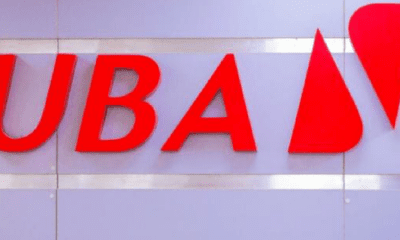Money market
Zenith Bank, UBA, others declare N389.8bn dividend in two years
Six banks which are Zenith Bank Plc, United Bank for Africa Plc (UBA), Stanbic IBTC Holdings Plc, Ecobank Transnational Incorporated (ETI), FCMB Group Plc and Jaiz bank Plc declared N198.2 billion, and N191.6 billion dividend in 2021 and 2022 respectively.
Meanwhile, Access Corporation, Guaranty Trust Holding Plc, Sterling Financial Holdings Company Plc, Union Bank Plc, Wema Bank Plc, Fidelity Bank Plc, and FBN Holdings are yet to submit 2022 financial statement or declared dividend.
Analysis of the six banks results showed that Zenith Bank leads other financial institutions in profit and dividend pay out to shareholders, followed by UBA in 2022 and 2021.
The challenges in the domestic and global economy, which the six (6) out of thirteen (13) listed banks on the Nigerian Exchange Limited (NGX) declared a total of N389.8 billion as dividend to shareholders between 2022 and 2021 financial year.
The dividend payout is on the back of N1.32 trillion Profit After Tax (N691.97billion in 2022 and N631.41 billion in 2021) financial year.
However, in the year 2021 and 2022 witnessed upheaval globally and it came with significant headwinds across all emerging, among other markets. While, the Russia-Ukraine conflict, rising inflationary pressure, tightening monetary policy stances by major central banks, new waves of COVID-19 outbreaks and related lockdowns, as well as supply chain bottlenecks all took a heavy toll on the global economy in 2022.
Significantly, Zenith Bank between 2021 and 2022 declared a sum of N468.47 billion profit and proposed to shareholders a dividend of N197billion, while UBA declared N227.84 billion profit in two year and proposed a dividend of N71.82 billion.
Zenith Bank Group Profit After Tax had decreased by eight per cent from N244.6 billion to N223.9 billion because of the increase in the group’s effective tax rate from 12.7 per cent in 2021 to 21.3 per cent in 2022. and also an increase because of the effective implementation of the Finance Act.
“This significant increase is a one-off and is not expected to recur in subsequent years, it affected return on equity which reduced from 20.4 per cent to 16.8 per cent,” the bank explained in a statement.
For ETI, the management proposed a final dividend of 0.11 US cents per ordinary share in 2022 and 0.16 US cents in 2021.
While commenting on the pan-African bank performance in 2022, the CEO of Ecobank Group, Jeremy Awori in a statement said, “Ecobank’s strong 2022 performance reflects the strength of our diversified business model, growth momentum and efficiency, and was achieved despite operating in a challenging macroeconomic environment, which also included the difficulties that Ghana’s debt restructuring exercise placed on us.”
Capital market analysts lauded 2022 corporate earnings and dividend payout of Zenith Bank Plc, among others, stating that financial institutions in Nigeria are resilient to overcoming domestic and foreign challenges and declared dividend from their earnings.
The Chief Research Officer, InvestData Consulting Limited, Mr. Omordion Ambrose, while speaking said the 2022 performance of these companies are impressive and their dividend returns are more attractive when compared to yields on money market instruments.
He said, “From the results we have seen so far, Zenith Bank proposed N3.10 final dividend and UBA declared N1.1 dividend payout on the NGX. Some companies’ dividend payout were flat to show how the operating environment was challenging in 2022. Some of these companies over the years have been consistent in dividend payout to shareholders.”
Also speaking from a shareholders’ perspective, Chairman Progressive Shareholders Association (PSAN), Boniface Okezie stated that despite economic hardship, Dangote Cement, among others have reported impressive performance.
According to him, “As we have seen from their performance, there is resilience in the corporate world which means there is hope for our domestic economy. Those in the private world have put more handwork, diligence in growing profit and declared dividend in their move to give back to shareholders. These firms pay heavily for security, and infrastructure which is not their duty.
“Beyond valuation, dividend paying stocks can be a good source of stable income streams. Many investors will want to invest in companies with a history of growing dividend and the likes of Zenith Bank, UBA and Stanbic IBTC Holdings over the years have sustained dividend payout to investors,” he said.
The Managing Director/CEO APT Securities and Funds Limited, Mr. Garba Kurfi commended listed financial institutions for releasing impressive result and accounts for 2022, expressing concerns that the declared dividend by these companies did not reflect in the trajectory of the stock market in Q1 2023.
According to him, “These companies have declared impressive dividend payout to investors but I do not know why the NGX Bank index did not respond to dividend payout in the financial sector.
“Investors on the Exchange were concerned over political unrest, among other factors, and opted to sell some of these banking stocks. We hope these banking stocks will bounce back in the second quarter of 2023 once unaudited first quarter result and accounts are released to investing public.”
Money market
Lagos, India to boost trade partnership


The Lagos Chamber of Commerce and Industry and the Confederation of Indian Industry have signed an agreement to boost trade partnership.
In a memorandum of understanding in Lagos on Tuesday, both parties observed that the agreement would enhance avenues for effective collaborations.
Lagos Chamber of Commerce and Industry Deputy President Knut Ulvmoen said that the partnership’s focus was to leverage the trade capacity of both parties.
Ulvmoen said that both parties would explore capacity in Information and Communication Technology, medical, training, agriculture, manufacturing and export, among others.
He acknowledged what he described as robust and enduring trade relations between Nigeria and India.
He noted that over the years, both nations had witnessed a steady growth in bilateral trade with significant contributions from various sectors.
“Today’s meeting serves as a platform to, not only strengthen the existing partnerships, but also to forge new alliances that will contribute to the sustainable growth and development of both nations.
“Together, we must seize this moment to identify synergies, exchange expertise, and explore innovative solutions to economic challenges.
“Let us leverage the collective wisdom of our industries to develop actionable strategies that will drive inclusive growth, foster entrepreneurship, and enhance competitiveness,” he said.
Indian High Commissioner Shri Balasubramanian expressed his belief in shared growth and prosperity by both countries.
He also emphasised the importance of Nigerian-Indian business collaboration.
Balasubramanian stated that the government of India was making efforts to build capacity in trade, seeking private sectors’ partnership to identify projects that could be profitable to the trade structure of both countries.
“The opportunities existing between both countries are enormous as more than 155 Indian companies in Nigeria employ many Nigerians.
“From oil to steel; to healthcare, we are willing to link Nigerians up with their counterparts in India as we explore avenues of collaboration and partnership,” he said.
Money market
Naira remains at N1,350 as CBN targets FX inflow for liquidity boost


The naira on Tuesday steadied at 1,350 per US dollar on the parallel market, popularly called black market.
On Monday morning, the naira opened the foreign exchange (FX) market at the same rate before closing at N1,360/$1 on the same day at the black market.
At the official market known as the Nigerian Autonomous Foreign Exchange Market (NAFEM), the naira on Monday fell to 1,419.11 per dollar, the lowest since March 13, 2024 at the official FX market, following slowing inflows occasioned by the withdrawal of funds by Foreign Portfolio Investors (FPIs).
The intraday high closed at N1,451 per dollar on Monday, weaker than N1,410 closed on Friday. The intraday low also depreciated marginally to N1,060 on Monday as against N1,051/$1 closed on Friday at NAFEM, data from the FMDQ Securities Exchange indicated.
Dollars supplied by willing buyers and willing sellers declined by 52.16 percent to $147.83 million on Monday from $309.01 million recorded on Friday.
On day to day trading, the naira weakened by 5.63 percent as the dollar was quoted at N1,419.11 on Monday as against N1,339.23 quoted on Friday at NAFEM.
During the recent Monetary Policy Committee (MPC) meeting, Governor of the Central Bank of Nigeria (CBN), Olayemi Cardoso, emphasised the critical need to attract inflows to maintain liquidity in the foreign exchange market and stabilize the exchange rate.
In his statement, Governor Cardoso highlighted the importance of addressing inflationary pressures through exchange rate management to safeguard both price stability and long-term economic growth.
“Failure to tame inflationary pressure using the exchange rate channel may jeopardise not only price stability but also long-term growth,” stated Governor Cardoso.
Addressing concerns raised at the March 2024 MPC meeting, Governor Cardoso emphasised the need to reduce negative real interest rates to attract capital flows and enhance liquidity in the FX market. He stressed the significance of attracting capital flows through foreign portfolio investments and moderating exchange rate pressures to mitigate the impact of exchange rate pass-through on inflation, particularly in Nigeria’s import-dependent economy.
Commenting on the monetary situation, Mustapha Akinkunmi highlighted a decline in Nigeria’s reserve money by 24.91 percent to approximately N22.2 trillion by the end of February 2024. Despite this, broad money (M3) supply increased to N93.7 trillion, contributing to inflationary pressures. Nigeria’s external reserves also decreased to US$32.87 billion as of March 19, 2024, from US$33.68 billion in February 2024.
Although current reserves cover imports for 5.7 months of goods only and 4.5 months of goods and services, the country’s ability to repay short-term debts using reserves exceeded the threshold at 104.0 percent, he said.
According to him, the reserves-to-broad money ratio of 33.1 percent surpassed the 20.0 percent threshold, indicating Nigeria’s capacity to manage capital flows effectively.
Governor Cardoso’s emphasis on attracting inflows and managing exchange rate pressures underscores the CBN’s commitment to maintaining stability in the FX market and combating inflationary challenges in Nigeria’s economy.
Money market
Mobile channel most vulnerable, as financial institutions lose N17.67bn to fraudsters in 2023


Latest report by the Nigeria Inter-Bank Settlement System (NIBSS) on Annual Fraud Landscape (January to December 2023) has revealed that commercial banks, Point of Sales (PoS) operators and others lost about N17.67 billion to fraudsters in 2023.
The report published on its website on Monday identified mobile channels as the most vulnerable avenue for fraudsters notably Web and POS businesses.
The report noted that fraud perpetrated via mobile channels increased by five percent compared to the previous year.
It also suggested some of the regulations inputted to check fraud in financial institutions need detailed examination, modification and reinforcement.
According to the statistics revealed by the report, fraud count dropped by six percent to 95,620, as actual loss from fraud grew by 23 percent in 2023 when compared to 2022 with the first quarter being the month with the highest fraud volume in 2023 and the fourth quarter being the month with the highest fraud value.
It also disclosed that the month of May recorded the highest fraud count of 11,716, followed by February with 9,492 while October saw the highest actual loss in 2023 at N3.7 billion, followed by January with N2.7 billion. It said the count of Web Fraud decreased by 38 percent and ATM fraud recorded a 64 percent reduction from 2022 to 2023.
Also, in 2023, people aged 40 and above remained the primary targets of fraudsters, which NIBSS said signified a persistent focus on the targeting strategy of fraudsters.
“This sustained trend emphasises the enduring appeal of the demographic group as potential victims, reinforcing the need for continuous efforts to educate and protect individuals in this category from fraudulent activities,” NIBSS said.
In 2023, a total of 80,658 unique customers fell for the gimmicks of fraudsters which is four per cent less than 84,130 customers recorded in the previous year.
“This decline, though apparent, does not diminish the severity of the issue, urging the financial industry to remain vigilant, enhance security measures and collaboratively address the tenacious challenges posed by fraud,” it said.
-
capital market2 years ago
Rt.briscoe, FBNH, Others halts negative performance of stock market
-
Finance3 months ago
Court orders Sen. Victor Umeh to repay N136m bank debt to AMCON
-



 Abuja Update2 months ago
Abuja Update2 months agoUNDP, FG partnership needed to achieve inclusion, equity- Minister
-
Abuja Update1 month ago
Banks drive stock market performance with N147bn gain
-



 Business1 week ago
Business1 week agoTingo Group unveils Tingo Electric, Tingo Cola drink at Lagos launch
-



 Health2 weeks ago
Health2 weeks agoCapacity training will reduce migration of health workers- NPHCDA
-
News4 months ago
Oil thieves sponsoring malicious media campaign against Navy – Spokesman
-



 Infotech1 month ago
Infotech1 month agoWorld Backup Day: NITDA urges Nigerians to ensure backup of data














